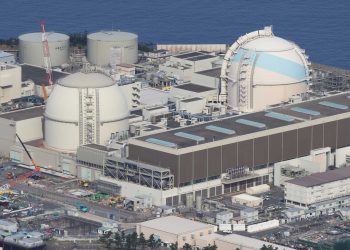Agence France-Presse,
North Korea has agreed to take further steps in ending its nuclear weapons programme but more needs to be done in pushing forward a landmark deal, the US envoy to disarmament talks said Friday.
As the six-nation talks went into a second day, US Assistant Secretary of State Christopher Hill again voiced hope that the secretive communist regime may declare and disable all of its nuclear programmes this year.
“The DPRK (North Korea) has agreed to some steps,” Hill told reporters when asked about the progress in the talks that are aiming to flesh out a plan for Pyongyang to quickly declare all of its nuclear programmes and disable them.
“We have looked at some of what they have agreed to. Frankly we like more, they like less. Let's see what we come up with.”
Hill said China, the host of the talks, was expected to distribute a draft joint statement later Friday from all six parties that would lay out exactly what North Korea should do by the end of the year.
North Korea had signalled ahead of this week's session that it was willing to continue pushing ahead with a landmark disarmament deal brokered in February in the six-nation forum, which also includes South Korea, Japan and Russia.
That deal saw North Korea agree to abandon the nuclear weapons programme it has spent decades developing in return for one million tonnes of fuel oil, as well as diplomatic and security concessions.
In July, North Korea shut down its main nuclear reactor at Yongbyon and four other related facilities.
In return it received the first deliveries of 100,000 tonnes of fuel oil and began diplomatic fence-building talks with rivals the United States and Japan.
The next phase currently under discussion would see North Korea give a full declaration of all the nuclear programmes it has developed.
This covers areas such as how much and what type of nuclear weapons making material it has produced, bomb detonating devices, and any other facilities that the North may not yet have told the world about.
Also under the phase being discussed this week, envoys hope the North would agree to disable all of its nuclear facilities.
Although Yongbyon and the other four facilities were shut down in July, Hill reiterated again on Friday that they still could be started up again quickly.
“For disabling to be meaningful it has to involve a concept of it being difficult for the DPRK to reconstitute nuclear programmes,” Hill said.
He said the US goal in disabling was to ensure the facilities could not be restarted for at least 12 months.
After the “declare and disable” phase, the parties would work towards a complete and irreversible scrapping of the North's nuclear weapons programme.
South Korea's chief envoy to the talks, Chun Yung-Woo, on Friday gave a similar account as Hill on the state of play in the talks, which are due to wrap up on Sunday.
“The differences (between the North and the other five nations) are not impossible to settle,” Chun said.
“I think it is a difference that can be settled because we have a political will to reach an agreement.”
The six-party talks began in 2003 but failed to stop the reclusive regime from conducting its first atomic weapons test in October last year.









